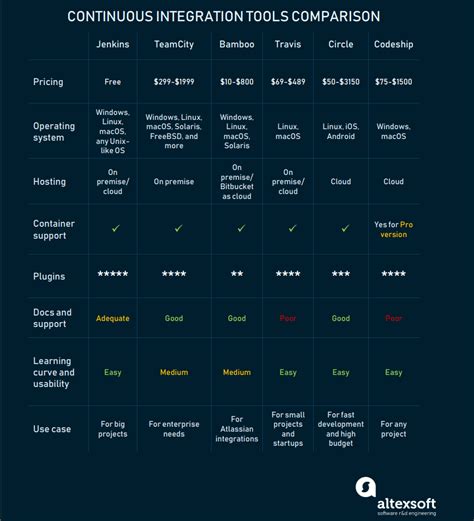Comparing Popular CI Tools: Which One is Right for Your Team?
Continuous integration (CI) tools are essential for any software development team. They help teams automate the process of building, testing, and deploying code quickly and efficiently. With so many different CI tools available, it can be difficult to decide which one is right for your team. In this article, we’ll compare some of the most popular CI tools on the market today and discuss their features and benefits.
Jenkins is an open-source automation server that has been around since 2011. It supports a wide range of plugins and integrations with other tools, making it highly customizable. Jenkins also offers distributed builds, allowing developers to run tests in parallel across multiple machines. This makes it ideal for large projects with complex build processes. Additionally, Jenkins provides detailed reporting and analytics, giving you insight into how your builds are performing.
Travis CI is another popular choice for continuous integration. It is cloud-based and integrates seamlessly with GitHub, making it easy to set up and use. Travis CI also offers support for multiple languages and frameworks, including Java, Python, Ruby, and Node.js. Additionally, it allows users to customize their builds with environment variables and custom scripts.
CircleCI is a cloud-based CI tool designed to make it easier for teams to collaborate on projects. It offers powerful features such as parallelism, caching, and workflow customization. CircleCI also integrates with GitHub, Bitbucket, and GitLab, making it easy to get started. Additionally, its intuitive UI makes it simple to configure and manage builds.
GitLab CI is a self-hosted solution that comes bundled with the GitLab platform. It offers a wide range of features, including pipelines, jobs, artifacts, and more. GitLab CI also integrates with Docker, allowing developers to easily deploy applications to production. Additionally, it provides real-time feedback and insights into the performance of each build.
Finally, there’s Azure Pipelines, Microsoft’s cloud-based CI/CD service. It offers a comprehensive suite of features, including automated builds, release management, and deployment. Azure Pipelines also integrates with GitHub, allowing developers to trigger builds from pull requests. Additionally, it provides built-in security scanning and compliance checks, ensuring that all deployments meet industry standards.
When choosing a CI tool for your team, it’s important to consider your specific needs and requirements. Each of these tools offers unique features and benefits, so take the time to evaluate them carefully before making a decision. Ultimately, the best CI tool for your team will depend on the size and complexity of your project, as well as your budget and timeline.
